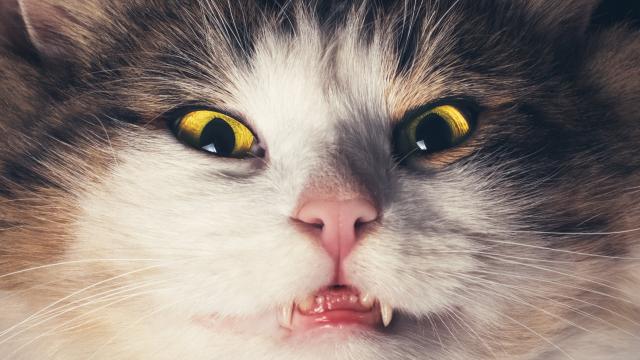Growing up with cats could have a strange effect on your mind, new research suggests. The study, a large review of existing literature, found that cat ownership at a young age was associated with a noticeably higher risk of developing schizophrenia and related disorders—a risk possibly fueled by increased exposure to the cat-hosted parasite Toxoplasma gondii. The findings don’t prove a cause-and-effect link between cats and schizophrenia, but they do warrant further research.
T. gondii needs cats to complete its complex life cycle, but it infects other, intermediate hosts to get there, particularly rodents. Once inside a rodent, the single-celled protozoan parasite will reach the brain and alter the host’s behavior, making them more fearless and therefore vulnerable to being eaten by cats. The parasite can also infect the brains of other large warm-blooded animals, humans included. Cat bites or exposure to their feces can expose us to the parasite, though we can also catch it from eating undercooked meat or drinking contaminated water. While human infections are a dead-end for T. gondii, they might still leave a lasting mark on us.
People can develop an usually mild but rarely life-threatening acute infection called toxoplasmosis, for instance (this is more common for newborns infected in the womb, which is why pregnant women are often told to not scoop cat litter if they can avoid it). And some studies have found that chronic infection with T. gondii cysts can potentially influence the behavior and brain health of humans and other large animals, if more subtly than in rodents. For decades, some scientists have speculated that early exposure to T. gondii, usually via cats, can raise the risk of schizophrenia, a mental condition that typically emerges in early adulthood.
Researchers in Australia decided to take a broad look at the evidence for and against this hypothesis. They looked at 17 studies in total, conducted in 11 countries over a 44-year span. Overall, the researchers found a “significant positive association between broadly defined cat ownership and an increased risk of schizophrenia-related disorders.” Even after adjusting for other factors, they found that the associated likelihood of having schizophrenia was roughly doubled in those who had cats growing up.
The results were published this month in the journal Schizophrenia Bulletin. And they do appear to pass muster, according to Brent Kious, a psychiatrist at the University of Utah Health’s Huntsman Mental Health Institute.
“This is a well-designed systematic review that comprehensively assessed the available literature about this topic, so it provides compelling evidence of an association. To that extent, it seems valid,” Kious, who was not affiliated with the study, told Gizmodo in an email.
Kious does note that most of the reviewed studies are retrospective, meaning that they look back in time to find potential associations. These types of studies are valuable but can’t fully rule other confounding variables or firmly establish a causal relationship. It’s possible, for instance, that people who go on to develop psychosis later in life are more likely to come from a family that owned cats for any number of reasons, rather than that having cats raises your risk of psychosis.
Another relevant issue is is that schizophrenia is rare. According to the World Health Organization, about one in 300 people worldwide are thought to have schizophrenia currently (0.32% of the population). So even a genuine two-fold increase in risk from growing up with cats would still result in a very small absolute risk of schizophrenia overall.
At the same time, the idea that T. gondii could cause schizophrenia and similar disorders in humans is certainly plausible, Kious says. It’s thought that cysts in mouse brains can independently produce the neurotransmitter dopamine, for example, and this extra dopamine could cause problems in a human brain as well.
“Excess dopamine release in the mesolimbic system is implicated in the pathogenesis of schizophrenia, so it’s conceivable that Toxoplasma-induced increases in dopamine contribute to the development of psychosis,” he said. “There’s also a lot of evidence that inflammation in the brain, which might increase synaptic pruning (cutting the microscopic connections between neurons), is involved in schizophrenia, and it’s likely that having a parasite in your brain increases inflammation.”
The link between cats, T. gondii, and schizophrenia definitely merits more study, Kious says. The likely strongest way to test this hypothesis would be to run a controlled experiment comparing the schizophrenia risk of kids exposed to T. gondii to those unexposed as they grow up. Unfortunately, that’s a study that wouldn’t be feasible or ethical for lots of reasons. But it might still be possible to explore and confirm this link by using data from prospective studies (ones that proactively track people’s health outcomes over a long period of time) that include questions about cat ownership, he says.
